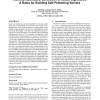Free Online Productivity Tools
i2Speak
i2Symbol
i2OCR
iTex2Img
iWeb2Print
iWeb2Shot
i2Type
iPdf2Split
iPdf2Merge
i2Bopomofo
i2Arabic
i2Style
i2Image
i2PDF
iLatex2Rtf
Sci2ools
CCS
2005
ACM
2005
ACM
Fast and automated generation of attack signatures: a basis for building self-protecting servers
Large-scale attacks, such as those launched by worms and zombie farms, pose a serious threat to our network-centric society. Existing approaches such as software patches are simply unable to cope with the volume and speed with which new vulnerabilities are being discovered. In this paper, we develop a new approach that can provide effective protection against a vast majority of these attacks that exploit memory errors in C/C++ programs. Our approach, called COVERS, uses a forensic analysis of a victim server’s memory to correlate attacks to inputs received over the network, and automatically develop a signature that characterizes inputs that carry attacks. The signatures tend to capture characteristics of the underlying vulnerability (e.g., a message field being too long) rather than the characteristics of an attack, which makes them effective against variants of attacks. Our approach introduces low overheads (under 10%), does not require access to source code of the protected serv...
| Added | 29 Jun 2010 |
| Updated | 29 Jun 2010 |
| Type | Conference |
| Year | 2005 |
| Where | CCS |
| Authors | Zhenkai Liang, R. Sekar |
Comments (0)

